Thursday Comics Hangover: Lost in space
Not so very long ago, if you were a kid and you wanted to read comics, you had a couple of choices: you could either read superhero comics, or you could read Archie comics. Now, the young adult comics scene is positively thriving. Teens can find realistic comics, fantasy comics, sci-fi comics, adventure comics, and romance comics in just about any comic book store.
In the last month, Image Comics has released a pair of new YA books that demonstrate the breadth and depth of the field. These direct-to-paperback books are a bit of a departure for the publisher — unlike most of Image’s output, they weren’t originally published in monthly serialized format — but hopefully they represent a new initiative for Image, because they’re excellent examples of the form.
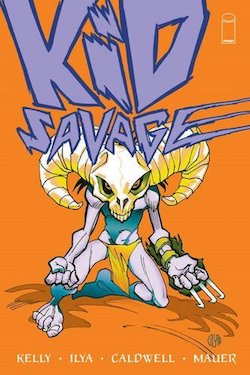
Kid Savage, written by comics veteran Joe Kelly and illustrated by the one-named and all-capped ILYA, is the most plainly high-concept of the two. It’s basically the family from Lost in Space if they adopted a pint-size Tarzan on their travels, with a reality-show twist. This volume is essentially an origin story, crashing the family on a primitive planet and pitting them against (and eventually alongside) the titular wild human.
Kid Savage is an appealing package. ILYA’s art is dynamic and expressive, with lots of bold lines and nuanced facial expressions from all the characters. (A couple of the action sequences, however, are very difficult to follow.) And Kelly does a fun tweak on the father-knows-best convention of traditional sci-fi by making the father of the spacefaring clan a bit of a hand-wringing boob who’s plagued by self-doubt and riddled with guilt. The son and daughter are forced to be the adults because the mom’s out of the picture, but that dynamic is immediately set into doubt when they run across a character who is basically nothing but raging id. It’s a good start to what is hopefully a series of sci-fi survival adventures.
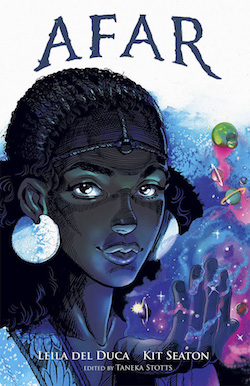
The other book from Image, Afar, defies easy description. It’s about a brother and sister in a post-apocalyptic society, but it’s not another example of the dreary survivalist yarns that have taken YA hostage over the last decade. The sister, Boetema, discovers that she has a fascinating power: when she sleeps, her consciousness comes to life in the body of an alien, somewhere else in the universe. Boetema inhabits the consciousnesses of beings like her (a humanoid race in an advanced civilization) and not like her (a squidlike creature wrapped in a sack at the bottom of a fishing boat) and she seems to have no ability to control what world she finds herself on next.
Afar is a cosmic space fantasy that also incorporates a complex political dynamic as the siblings try to survive in a punishing desert culture. With her head in the stars, Boetema finds it more and more stressful to take care of her brother while also intermingling her consciousness with alien cultures halfway across the universe. It’s a perfect read for those kids who are perennially daydreaming, because it’s a story about what you can do when you allow your mind to wander.
Young readers will find the story, by Leila Del Duca, to be dense and rewarding. But the art by Kit Seaton is what will draw people in. Seaton is adept at conveying the ideas behind entire alien civilizations in just a handful of panels, and her skillful use of color and perspective keep Boetema’s “dream”-life clearly delineated from her “real”-life. There’s never any doubt where we are in the story at any point, which is a testament to Seaton’s ability to keep a reader grounded in a story that briefly features a planet of wizard-dogs.
This is the kind of book I wish I’d found in a school library when I was 15. Afar doesn’t just give readers a new, alien world; it introduces readers to ten of them, and inspires them to wonder about all the possibilities out there in the great big universe.
Your Week in Readings: The best literary events from April 26th - May 2nd

Wednesday April 26th: Edible City Reading
Edible City is an art book designed as a showcase for the MOHAI exhibit of the same name. It profiles the food-based traditions of the Pacific Northwest with photographs, recipes, and stories about Pike Place Market, Rainier cherries, and more. Exhibit curator Rebekah Denn will host the reading and discussion. Third Place Books Lake Forest Park, 17171 Bothell Way NE, 366-3333, http://thirdplacebooks.com. Free. All ages. 7 p.m
Thursday April 27th: Void Star Reading
Novelist Zachary Mason is also a computer scientist who specializes in artificial intelligence. So while he works in a field that will eventually destroy all of humanity — Terminator 2 was a documentary, people! — he explores the idea of what it means to be human in his new novel, Void Star. Elliott Bay Book Company, 1521 10th Ave, 624-6600, elliottbaybook.com . Free. All ages. 7 p.m.Friday April 28th: New Beginnings
Anastacia-Renee Tolbert, the current Hugo House poet-in-residence, headlines a reading exploring the ideas of “new beginnings, non-gender conformity, ‘safety,’ and womanism,” Readers include Hawaiian fiction writer Kristiana Kahakauwila, poet Lauren K. Alleyne, and Seattle poetry phenomenon Jamaica Baldwin, who burst onto the scene a year ago and has been wowing audiences ever since. Hugo House, 1021 Columbia St., 322-7030, hugohouse.org. $10. All ages. 7 p.m.Saturday April 29th: Seattle Bookstore Day
See our Event of the Week column for more details. Various locations, https://www.facebook.com/SEABookstoreDay/. Free. All ages. 10 a.m.Sunday April 30th: 2017 Grand Slam
Did you know that Seattle is home to a lively open mic scene? It’s true. The viral poet behind “Revenge,” Elisa Chavez, is just one of the incredible talents to burst out of this scene in recent years. Tonight, the greatest readers at Seattle Poetry Slam compete for the right to represent Seattle at the 2017 National Poetry Slam in Denver. Town Hall Seattle, 1119 8th Ave., 652-4255, townhallseattle.org. $15. All ages. 7:30 p.m.Monday May 1st: Last Day on Mars Reading
Prolific Seattle novelist Kevin Emerson’s latest book Last Day on Mars is a sci-fi novel about a young human who must struggle to survive when humanity flees the destruction of Mars. Tonight, Emerson will give an all-ages lecture on the latest scientific understanding of Mars. University Book Store, 4326 University Way N.E., 634-3400, http://www2.bookstore.washington.edu/. Free. All ages. 7 p.m.Tuesday May 2nd: Two Paths: America Divided or United Reading
Okay, look: Ohio Goveror John Kasich is a Republican. And he’s not one of those mythical cuddly Republicans: he’s anti-abortion and he’s very weak on income inequality. But! He’s one of the few Republicans with the guts to refute Trump to his face. So maybe come figure out if common ground is a possibility? Theatre at Meydenbauer Center,11100 NE 6th St., Bellevue. (206) 366-3333, http://www.thirdplacebooks.com/. $36. All ages. 7 p.m.You'll laugh, you'll cry
Published April 26, 2017, at 11:00am
Patricia Lockwood reads from her new memoir Priestdaddy at Elliott Bay Book Company next Wednesday, May 3rd. Does one of America's best poets have what it takes to be a memoirist?
Literary Event of the Week: Seattle Independent Bookstore Day
This Saturday, April 29th, 23 area bookshops will be taking part in the third annual Seattle Independent Bookstore Day. You — being the discerning lover of literature and an ardent supporter of local businesses staffed by real, live humans that you are — don’t need me to tell you why independent bookstores are the motherfucking cultural glue that holds our entire city together. So you’ll obviously want to head out to your two or three favorite bookstores to buy a book or two, say hi, and enjoy some special events.
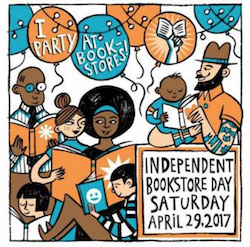
Also this Saturday, the most hardcore of you book-lovers will attempt to visit at least 19 of these 23 bookstores. This is an arduous journey, stretching from Poulsbo’s Liberty Bay Books to the Edmonds Bookshop to BookTree Kirkland and all Seattle’s neighborhood shops. It’s a difficult trip involving lots of traffic, sketchy parking, and a lot of planning, but those who succeed will get a 25 percent discount on every purchase at any of these stores for the whole year.
But say you can’t spend a whole day trekking from the stately Eagle Harbor Book Company on Bainbridge Island to the delightful Neverending Bookshop in Bothell. That’s okay! Participation in the marathon isn’t required; all you need to do is show up and make your appreciation known. Bookstores will be selling special available-for-one-day-only books from authors like Rainbow Rowell and Michael Chabon, along with literary condoms and a vinyl version of podcast sensation Welcome to Night Vale. And independent Seattle-based audiobook seller Libro.fm will be giving out free audiobooks — including one of David Foster Wallace’s very best essays, “A Supposedly Fun Thing I’ll Never Do Again” — at participating locations.
Here are some special Seattle Independent Bookstore Day events you should know about:
Local restaurateurs Tom Douglas, Molly Wizenberg, and Heather Earnhardt will be doing special appearances with cooking demos (and samples) at Fremont’s Book Larder.
University Book Store will be hosting all sorts of events for kids, including maskmaking and storytimes and some sort of a balloon animal menagerie thing happening at 2:30 pm.
Seattle poet Meredith Clark will be stationed at Elliott Bay Book Company from 2 to 4 pm making erasures — that’s carving poems out of the existing text on a page of a preexisting book — for anyone who asks. Additionally, Fogland Studios will be operating a printing press in the middle of the store, publishing zines and posters while you wait.
Why aren’t there more cookbooks in comic book form? Comics are the perfect medium for cookbooks, visually walking readers through every step in the process of cooking eventhe most complex recipes. From 1 to 3 pm, Fantagraphics Bookstore and Gallery in Georgetown is hosting a release party for a new minicomic, the Northwest Cartoonists Cookbook, featuring recipes from a murderer’s row of Seattle cartooning talent including Ellen Forney, Marie Hausauer, David Lasky, Kelly Froh, Megan Kelso, Simon Hanselmann, Mita Mahato, and Colleen Frakes.
This is your day, literary Seattle. Go make it a good one.
Seattle Arts and Lectures celebrates its 30th anniversary with a slate of authors including Pulitzer winners Tyehimba Jess, Viet Thanh Nguyen, and Colson Whitehead
Tonight, Seattle Arts & Lectures announced the lineup of authors for their 2017-2018 season. This season will mark SAL’s 30th anniversary as one of Seattle’s guiding literary lights, and SAL curator Rebecca Hoogs has worked to assemble a slate of readers that calls back to some of SAL’s most successful events and forward to the future of literary arts.
For the poetry series, readers include Steph Burt, a professor of English at Harvard University who’s also known as Stephen or Stephanie Burt; classical translator A.E. Stallings; a conversation between poets Rachel McKibbens, Benjamin Alire Saenz, and Javier Zamora. Maybe the most exciting of the poetry announcements was Tyehimba Jess, whose Wave Books collection Olio just won the Pulitzer Prize for poetry. Jess will be reading at McCaw Hall on Sunday, March 4th of next year.
The literary series, which will stay at Benaroya Hall for the next season, will feature:
- Alexander Hamilton biographer (and author of the source material for mega-musical Hamilton) Ron Chernow on Wednesday, October 18th of this year.
- Beloved novelist Isabel Allende making her grand return to SAL on Tuesday, November 28th of this year.
- Novelist Jesmyn Ward, whose memoir Men We Reaped examines America’s ritual sacrifice of young black men, on January 17th.
- Pulitzer Prizewinning novelist Viet Thanh Nguyen (author of The Sympathizer) on May 7th, 2018.
- A special performance of the Moth storytelling series at McCaw Hall on Wenesday, May 23rd of next year.
- And — this is the one that's going to break the online box office, I bet — Pulitzer Prizewinning novelist Colson Whitehead makes his SAL return next spring.
You can buy tickets to these shows starting tonight on SAL’s website.
SAL leadership is also teasing some big changes for their big 30th anniversary. They’re promising a new website (with a new ticketing service) by fall of this year, and they’re arranging the rights to release some of their archived shows from the past 30 years on the site.
The organization as a whole, after going through some rough times a few years back, is strong and only getting stronger. SAL executive director Ruth Dickey told me that over the last four years, the organization doubled its numbers of subscribers and donors — a remarkable feat for a literary arts organization preparing to enter its fourth decade in this city.
Book News Roundup: Sarah Galvin's going on a European book tour, Jim Demonakos is leaving Emerald City Comicon
You can add poet Sarah Galvin to the short list of Seattle authors who have gone on a European tour. Starting on Sunday, Galvin will be traveling to bookstores in Amsterdam, Krakow, Paris, Berlin, and Reykjavik in support of her terrific new collection out from Gramma Press, Ugly Time. If you know anyone in or near those cities, let them know by sending them a link to the tour page.
Heidi MacDonald at the Beat broke some pretty big news this morning: Jim Demonakos, the Seattle-area comics retailer who started Emerald City Comicon, has left the organization. Two years ago, Demonakos sold ECCC to ReedPop, an international producer of comic book conventions. "I’m not leaving for another job, I don’t have an immediate new project," Demonakos wrote in a Facebook post announcing the change. This means that next year's ECCC will be the first time the show is not produced by its founder. It'll be interesting to see if the convention can maintain its essential Seattle-ness without Demonakos at the lead.
At Strong Towns, Kea Wilson wrote a piece about why urbanists need to talk about Amazon:
Amazon has made it their business model to make you think that way: they market themselves as your friendly, invisible big box store, with all of the benefits and none of the massive, concrete drawbacks of the K-Marts of the world that you’ve (rightly) come to distrust. All you see is the website, algorithmically manipulated to show you everything you want and need—and two days later, a little brown box on your doorstep with a smile printed on the side.
Jimmy Wales, the founder of Wikipedia, is launching an interesting new news organization. I don't know if Wikitribune will actually work, but it's always worth your attention when people try new models of journalism.
The bookstore that trolled Piers Morgan on Twitter is now in the middle of a crowdfunding campaign to stay open.
This 2011 video of a carwash for books is making the rounds on Twitter and it's so terrific that you should watch it again:
I quit drinking almost ten years ago now, so guest-starring on an episode of Drunk Booksellers, in which booksellers get drunk and talk about books, presented a unique problem. The solution, however, was pretty simple, since the hosts and I all live in Washington state: get high! It was a special honor to appear on the first-ever pot-centric Drunk Booksellers episode.
The shownotes for the episode are fantastically detailed and contain links to every book we discussed. It was a really great conversation about bookselling, diversity, criticism, and what we're excited to read this spring. I hope you'll give it a listen.
And even if you don't want to hear my voice — and, really, who can blame you? — I highly recommend the Drunk Booksellers podcast and encourage you to subscribe. It is literally the only bookish podcast that I listen to, and I think you might like it, too.
For Theodore Roethke
The poet who was my teacher said we must rewrite.
It was a warm afternoon. Sun dabbled in the greenhouse.
So now I revise and revise until I think the real writing
is rewriting. First drafts are small forays into the hills
from which I bring back a pail half full of unripe
blueberries that may, on closer look, be
some other kind of fruit entirely. I remember
he leaned back in the chair and waved his hand
and said my poem describing salmon was really about sex.We stood facing the faded paint of Parrington’s walls
each Friday, memorizing lines of a poem we chose to recite —
to learn the sound of the words together and the little spaces
between the sounds. Each of us quaked.
Inside the classroom he turned to the ravishing co-ed on his right,
the one with the throaty voice and said,
Play that for us on your bazooka, will you, honey?
She nearly fainted but she spoke the lines.
No one has ever made Louise Bogan sound like that.He brought a straw hand basket belonging to his wife.
It was stuffed with books. “She’ll kill me,“ he said,
heaving it down on the table, the one who taught him
Turn and Counter-Turn and Stand, who taught him Touch,
that undulant white skin. We leaned to see what rivers
might pour forth, what three-beat lines, what metaphysical
poets hidden between the spines, what rose, what sorrow.
Later, in my car beneath the flagpole, he said to kiss him on his cheek just once. In the rearview mirror, there she was.Who, sitting in the tea house, doesn’t know he died too soon?
Beyond the posts and beams, a roof of glass.
the swimming pool is sculptured sand. Five rocks
(the five-beat line?) mark where his breath last sighed
to any bird: the anniversary of his death day.
The last thing he said to me was,
There’s going to be a special graduate class next fall
and you’re in it. Years passed and one by one
we learned he said that to all of us.
Thirty years of an amazing local publisher
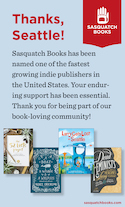
Sponsor Sasquatch Books is thirty! They have a message for the readers and book buyers, like you, who helped make them a success. It starts with "Thank you, Seattle!" Read the whole message, and see a great graphic about the history of this great local success story on our sponsor's page.
Sponsors like Sasquatch Books make the Seattle Review of Books possible. Did you know you could sponsor us, as well? Get your stories, or novel, or event in front of our passionate audience. We're sold out through early June, but there are a number of dates available before we release our block of dates for the second half of the year. Take a glance at our sponsorship information page for dates and details.
The author of the highly influential book Zen and the Art of Motorcycle Maintenance has died at age 88, reports Nick Moran at the Millions.
Cormac McCarthy just published the first non-fiction piece of his career and it's pretty much the best thing ever.
Talking with Thomas Frank about the "fraud" and "scam" of American higher education
Last week, Thomas Frank was in town to read at Town Hall Seattle from his new-in-paperback book Listen, Liberal. If you're looking to understand what went wrong with the Democratic Party over the last few years, this is the book for you: Frank explains that Democratic leaders have over time shifted the Democrats from a working-class party to a league of meritocratic professional elites. While Frank was in Seattle, he agreed to meet for a podcast interview for my day job at Civic Ventures. The full interview will be released on Thursday of this week as the first episode of the second season of our new podcast, The Other Washington. (You can subscribe to our podcast on iTunes or, as they say, wherever you get your podcasts.) But for now, here's a sample of our conversation.
I very much enjoyed Listen Liberal. I wish I'd read it sooner. A lot of the book is given over the argument that the Democratic Party is in thrall of elitists who've risen through the secondary education system. You argue that the Democratic Party has become a meritocracy that rewards cautious thinking and conventional wisdom. One thing about the book that I kept waiting for you to do — and one thing that the book always felt like it was on the precipice of doing — was going after secondary education in this country. Because all these elitist people have to come from a system, right? It just repeatedly walks up to the idea of talking about systemic educational reform and then backs off. I was wondering if that’s something you’re working on next?
I already did. There’s no reason why you would know this, but I wrote a series of essays for The Baffler magazine and Harper's magazine about universities, college admissions, all the various scandals in universities, and also about adjuncts.
Back in the 80s and 90s, I went to graduate school in American history. I got a PhD. I wanted to be a professor. I wanted to be a historian. What I discovered as soon as I got my PhD is that the path to being a tenured professor in the American university system had basically been closed to my generation, and to all the succeeding generations.
Instead, professors and university teachers have been casualized. You get your PhD and go out and you have to work as what's called an adjunct, you make very, very, very — you'd be surprised how little these people get paid to teach college students. The majority of university classes in America are taught by adjuncts. They get paid very, very, very little.
The university system has fascinated me because on the one hand the price tag is now, as we all know, outrageous. It's completely off the handle. University of Chicago, where I get my PhD, is close to $65,000 a year now. They're all like that. All of your top tier universities are like that.
State universities are following along behind as they get defunded by the states. The tuition is incredibly high, and yet the people who teach the courses are basically sub-minimum wage employees. Someone forwarded me an article a while ago; it was talking about various people who work at low-wage occupations and what they might do to help themselves. It was listing the low-wage occupations — like people who work in fast-food, people who are in housekeeping, this kind of thing.
One of the occupations that was listed was university teaching. You have to get a PhD to do that! That takes many, many, many years. You're supposed to be the smartest and the best, and all that crap, right? You've done well on your tests and everything, and you've got straight A’s and you've read every book in the goddamn library. That's your future, and it stinks.
That split — that universities are incredibly expensive and university teachers by and large get paid next to nothing — whoa, that is shocking when you put those two facts together and when you try to understand the American university system. And at the same time, the prestige of [the university system] grows and grows and grows.
I live in Bethesda, Maryland. More than 50 percent of the population has an advanced degree of some kind. Everybody has internalized the hierarchy of educational institutions. This is important to everyday life: where I live, people know that such and such a school is really, really, really good and such and such another school is not quite as good.
A friend of mine, his son, I think his son was ten at the time, said, "Daddy, is Williams above Princeton, or is Princeton above Williams?" Of course, his dad knew what he meant. The kid was trying to figure out the hierarchy of American higher education at age ten. This is common where I live. Where you go to college is this incredibly important thing — it's putting a brand label on you. We all know these stories once you start digging into the American university system — the words “fraud” and “scam” just instantly come to mind. Sorry, that's the way I feel about it.
At the same time, remember, I'm a great believer in this. I got a PhD. What would make me happiest in my life would be to spend all my day sitting in the stupid library and writing another dissertation. I love that way of life.
The Sunday Post for April 23, 2017
Each week, the Sunday Post highlights a few articles good for slow consumption over a cup of coffee (or tea, if that's your pleasure). Settle in for a while; we saved you a seat. You can also look through the archives.
End Pain Forever
Steven Pete feels no pain. Even broken bones bring only a slight discomfort. For Pam Costa, any warmth burns like fire; she takes morphine every morning and sleeps on ice-cold pillows. Although the two Washingtonians live just over an hour apart, they’ve never met — but their cases are helping identify a gene that could be used to control chronic physical suffering. Erika Hayasaki documents this classic scientific detective story.
As a child, Costa would dawdle in the deep gutters lining the streets near her home, the cool, mucky water providing her momentary pain relief. In classrooms she would wrap her hands and feet around the poles of a desk, like a koala, to feel the coolness. And she’d sneak off to water fountains to wipe down her limbs with cold water.
Doctors didn’t know how to diagnose her. Some adults thought she had behavioral issues or depression. One physician said her symptoms were psychosomatic. The plum color was the only visible evidence that she might have any medical disorder at all. Then, in 1977, when Costa was 11, a letter arrived from the Mayo Clinic.
God in the machine: my strange journey into transhumanism
Ex-Evangelical Meghan O’Gieblyn is really, really good at describing what it’s like to lose your faith — to be dislocated in time, even to lose your sense of your own body as you lose your sense of God. That makes it easier to understand how a new, outlandish set of beliefs, the transhumanism favorited by tech elitists like Elon Musk, could slip unconsidered into the gap.
The deeper I got into the articles, the more unhinged my thinking became. One day, it occurred to me: perhaps God was the designer and Christ his digital avatar, and the incarnation his way of entering the simulation to share tips about our collective survival as a species. Or maybe the creation of our world was a competition, a kind of video game in which each participating programmer invented one of the world religions, sent down his own prophet-avatar and received points for every new convert.
By this point I’d passed beyond idle speculation. A new, more pernicious thought had come to dominate my mind: transhumanist ideas were not merely similar to theological concepts but could in fact be the events described in the Bible.
The Heart of Whiteness: Ijeoma Oluo Interviews Rachel Dolezal, the White Woman Who Identifies as Black
Ijeoma Oluo’s piece on Rachel Dolezal for The Stranger went viral this week, and rightfully so. Oluo perfectly expresses the frustration of trying to engage Dolezal, who is endlessly slippery and self-protective — just reading their exchanges is maddening. Then she neatly pivots out of the game of “she said, she said”: out of the pseudo-academic arguments, out of the crocodile tears, and back onto terra firma. Here’s hoping this can be her final word.
When the story first broke in June 2015, I was approached by more editors in a week than I had heard from in two months. They were all looking for "fresh takes" on the Dolezal scandal from the very people whose identity had now been put up for debate—black women. I wrote two pieces on Dolezal for two different websites, mostly focused not on her, but on the lack of understanding of black women's identity that was causing the conversation about Dolezal to become more and more painful for so many black women.
After a few weeks of media obsession, I—and most of the other black women I knew—was completely done with Rachel Dolezal.
Or, at least I hoped to be.
How to Read a Whole Damn Book Every Week
I don’t know, Kevin Nguyen; this is all fine practical advice, but doesn’t it boil down to — if you want to read more, read more? We don’t need a listicle for that, or a Fitbit so we can track page counts against our friends. However, in case you do want some highly amusing guidance on how to read in the absence of a comfy chair, a few hours, and glass of scotch, here it is.
Before you tell me how much you “enjoy the smell of print books” like some kind of psycho, let me try to sell you on the convenience of reading in the Kindle or iBooks app: you’ll always have your books with you, and most importantly, you can always get through a little reading in those lost minutes of the day — waiting in line for coffee, for the 4-train running behind schedule, and for the bathroom because you drank too much coffee. Those pages add up fast.
Seattle Writing Prompts: The Arctic Building
Seattle Writing Prompts are intended to spark ideas for your writing, based on locations and stories of Seattle. Write something inspired by a prompt? Send it to us! We're looking to publish writing sparked by prompts.
Also, how are we doing? Are writing prompts useful to you? Could we be doing better? Reach out if you have ideas or feedback. We'd love to hear.
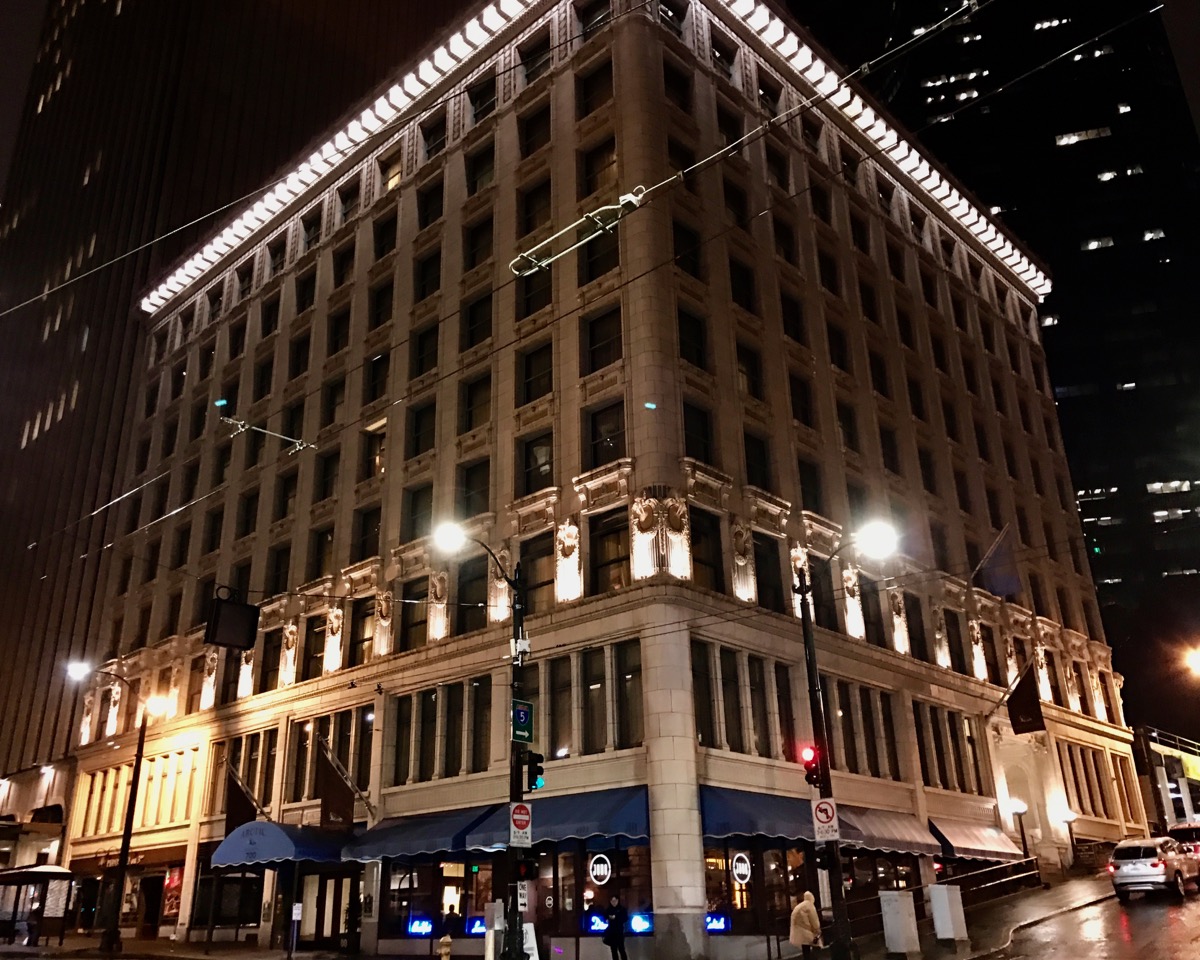
One of the great stories of Seattle took place in this building. One of the great facades of Seattle buildings graces its exterior. Now a hotel, once a club for “explorers”, (but mostly the people who did business with them), the Arctic Building isn’t the largest building in Seattle, nor is it the most important, but it may just be one of the most interesting.
It was raised in 1916, by some lucky sods who had made off like bandits in the Klondike gold rush. At least that’s what the myth is. As Seattle well knows, most of the money was in outfitting the fools who went prospecting, not in the prospecting itself — this is the story of early Seattle. The primary funder of the club, James Moses, made his money in pottery, not gold or pickaxes and tents. And he wasn’t even a Seattle resident. The Arctic Club had strong ties to New York, where there was another club, and Chicago.
You would join the club if you wanted to reinforce your business connections to the Alaskan territory. The bar, which was once housed in an older building the club used before the building we all love so much was built, was apparently stolen through a window one night when nobody was paying attention.
The modern hotel bar is a good place to grab a drink these days — they faithfully, as possible, recreate the look-and-feel of a vintage lounge, although the drinks will set you back more than they did back in the early days. Here’s a hint: walking up to the parking lot on the corner of Cherry and Fourth allows you to walk up pretty close to one of the walrus cartouches — they’re gonna raze that to make a new skyscraper soon, so do it while you can.
And that great story? Be warned: it’s a tragedy. It centers around Marion Zioncheck, a leftist firebrand politician, who was elected to the US Senate as a representative from Washington. He was a staunch New Deal Democrat who had a wild streak, apparently. He was arrested with his wife for drunkenly cavorting in a fountain. He sent manure to J. Edgar Hoover. He was, by all accounts, completely crazy.
He announced he was retiring, and set the stage for his college buddy Warren Magnuson (the park is named for him) to run in his stead. But then, Zioncheck changed his mind. One August evening, in 1936, Zioncheck’s wife of four months Rubye was waiting in the car for him. He was in his office on the fifth floor of the Arctic Building. They were all set to go out to an event.
And then, his body tumbled down from the sky, smashing into the street in front of poor Rubye, almost hitting pedestrians, and ending the life of Marion Zioncheck. The fall was ruled a suicide, and in fact, there was a note left behind, and a witness, his brother-in-law who claimed he was trying to stop him from the act. There are those who think otherwise.
History is funny like that. It leaves buildings behind with these ghosts. I caught the bus on Third between Cherry and Columbia for years, and I walked past the spot where Zioncheck fell nearly every day. I never thought about him, save for when I was telling someone the story. Funny how we just move on and don’t remember. How a building can just be a nice hotel now. I wonder if you could sleep in the room that has the window he jumped from? Might be worth asking at the front desk.
One thing’s for sure. There are heck of a lot of stories waiting to come out of that building.
Today's prompts
It was midnight when they broke in to the old Arctic Club. The new building was ready, and there was just one thing then needed. The building was quiet as they opened the massive window as high as it would go, and started breaking loose the large wooden bar. It was theirs, and they were gonna take it.
That old building on Third and Cherry was in poor repair, in 1975, and not looking so great. A woman, a waitress at the Harbor Club atop the Norton Building, was rushing down the hill in her heels, trying not to be late for her shift. When suddenly, she was grabbed by the waist and pulled aside. A tusk from one of the walrus friezes crashed to the sidewalk where she would have been. "Are you okay?" That voice...she turned, and gasped when she saw who had saved her.
They could only do it when the bar was slow, but it was a fun game. They tried to guess which couples getting hit on would go back to a room together. On a good night, they had a couple of hits. Occasionally, they stopped a creep from harassing someone. But when one of them elbowed the other to point out the man in the green suit making a move on the woman in the black wrap dress, what they never expected was to get pulled into the middle of an international incident.
They gathered every full moon. They wore black robes, and gathered under the walruses. They shined their lights up onto the building and began their chant. All hail the walrus! The walrus who brings life! They knew they'd have five minutes tops before the cops came, at least that was the average. But this time they had something planned that would change things. This time, they wouldn't be chased away so easily.
What was amusing was the one time she stayed in a hotel and could hear the neighbors next door spanking each other. What was not amusing was being in a hotel and hearing the neighbors next door yelling at each other in scary ways. But when she called the front desk to report them, all she was told was "Lock your door and don't leave your room until we tell you its safe", and the line went dead. Then the screaming in the hall started.
Why I'm not reading the new book about Hillary Clinton's campaign, and why you shouldn't either
After the 2008 and 2012 elections, I was very much enthralled by John Heilemann and Mark Halperin's quick-published insidery accounts of the presidential campaigns. Game Change and Game Change: Double Down both piqued my interest with their gossipy tone and their inside-baseball chattiness.
Now, of course, it's pretty obvious that Mark Halperin is an awful person, and an even worse journalist; he sucked up to Donald Trump at just about every opportunity during the 2016 elections. His pro-Trump leaning during this last election cycle was saccharine enough to help me realize what I'd hidden from myself over the last four years: Halperin's work isn't interested in what's right or even what happened. He's only interested in who's on top, and how much access he can skim from them. I'm retroactively embarrassed that I enjoyed his books so much.
But it's not just Halperin: this election has soured my entire perception of the quick-turn post-election genre. I love books that investigate presidential campaigns, but there have been a spate of titles over the last few election cycles that have been published within six months of Election Day, and they are more harmful than good.

All of this is a long way of saying that even though some part of me wants to read Shattered: Inside Hillary Clinton's Doomed Campaign for all the gossip and forehead-slapping it would inspire, some larger part of me understands that these auto-published postmortems are toxic. I'm not going to read Shattered, and I'd urge you to consider not reading it as well.
There's a cliche that's been pretty popular on political podcasts in the days since the 2016 election. It has many variations, but it always goes something like this: in retrospect, every winning campaign looks brilliant, and every losing campaign looks hopelessly, impossibly dumb. The truth is never that simple.
Yes, Clinton's campaign team made awful decisions. Obviously. I don't want to exonerate anyone, here.
But I just don't know what good any of this is doing anyone. Democrats are still trying to argue over where everything went wrong in the 2016 election, and the truth is that it just doesn't matter. We know what must be done: Democrats have to propose big policies that appeal to more voters, and they have to explain why those policies are better than the policies that the other side is proposing. Democrats also have to listen to average people, and respond to the needs of average Americans — Americans of every color and class and creed. I think those statements are non-controversial enough that most Sanders voters and most Clinton voters would agree with them.
One day, the residue of filth covering the 2016 election will be less greasy. Our responses to the memory of the year will grow less immediate, less visceral. And one day someone will write a book — a deeply reported, dense, smart work of journalism — about the Clinton campaign. I can pretty much guarantee that Shattered is not that book. Reading it is just picking at fresh scabs, and it will likely leave you looking to start arguments that can have no winners.
The time now is to look forward, not back. Democrats should be reading about policy and not personality. Now that a reality show star is in the White House, it should be obvious to everyone that there's no room for reality-show antics in our media coverage of the campaigns.
We must be better than this.
On their Facebook page, someone on the Phoenix Comics staff writes:
We wish we had better news to share this morning, but sadly we were the victim of a smash and grab robbery early this morning. Fortunately we have a glass company already working on it and the door should be fixed with no expected interruption to store hours or events today.
The store reported on Twitter that their door has already been fixed. But still: Boo. What kind of an asshole breaks into a comics shop? (Answer: one of the very bad kinds of assholes, not one of the sort of okay kinds of assholes, like Irish pirate queen Grace O'Malley or literally any role Benedict Cumberbatch has ever played.)
If you have a few extra dollars to spend this weekend, maybe drop by Phoenix and pick up a comic or a game. It's important at times like these to come together and make a statement that we do not tolerate this kind of awful bullshittery in our city.
The Help Desk: The inedible journey
Every Friday, Cienna Madrid offers solutions to life’s most vexing literary problems. Do you need a book recommendation to send your worst cousin on her birthday? Is it okay to read erotica on public transit? Cienna can help. Send your questions to advice@seattlereviewofbooks.com.
Dear Cienna,
My local bookstore is great, except for one thing: the attached café is terrible. I fantasize about buying a new book and demolishing a few chapters over a nice sandwich and a cup of coffee. I’ve tried it there a few times, but their food is unexceptional and their coffee tastes like it was filtered through someone’s underwear. The service is pretty bad, too. And don’t even get me started on the soup!
Yelp is for assholes, but I really think this would be the perfect bookstore if the meals it served were halfway edible. How can I improve the quality of food?
Jay, [Neighborhood Redacted by Request]
Dear Jay,
You live in a city that has developed a taste for the ridiculous – how am I supposed to know yours is any good? If you've ever compared the rich flavor of a roasted beet to eating out Mother Earth, if your table salt costs more per gram than viable eggs harvested from a healthy young white woman, if you've ever uttered the phrase, "I long to participate in a California grunion run," I cannot and will not help you.
But let us assume you are a reasonable person – the kind of person who can't quit Fritos Honey BBQ Flavor Twists because of their ass-pounding umami flavor. Assuming this, and knowing that independent booksellers are some of the most intelligent, reasonable, and open-minded people currently eating out Mother Earth, here is what I suggest you do: start small, with coffee.
Get coffee at your local bookstore on a regular basis, be friendly and tip well. Tipping well is the key – I'm talking very well, like 100 percent for each cup of coffee. Solicit friends and fellow book lovers to also do this. After a few visits, when you have established that you are friendly and generous, leave an extra big tip – like $20 – and write on the receipt something along the lines of "I love this bookstore and cafe, but the coffee tastes like TKTKTK. Maybe it's time for a change?" And don't just say "it tastes like shit," be polite but specific in your critique – it is weak, it is cold, it has strong notes of underwear. Encourage your friends to do the same.
The next time you go in, make small talk with the barista. Ask if the manager is open to changing things up in the cafe – like the coffee, for instance. Perhaps even nicely ask to talk to the manager face to face (I know technology has made the act of expressing a desire while maintaining sustained eye contact with another human being feel like an old-timey hobby instead of a healthy communication tactic, but it's worth a try).
You are incredibly lucky to have a local bookstore in your area. As I'm sure you know, they are not the stuff of get-rich-quick schemes, they are laborious acts of love. Once the managers/owners understand that you're a loyal customer and ally – as are the other people they're hearing from – I'd expect them to be open to change.
Kisses,
Cienna
Portrait Gallery: Rupert Reyes
Each week, Christine Marie Larsen creates a new portrait of an author for us. Have any favorites you’d love to see immortalized? Let us know
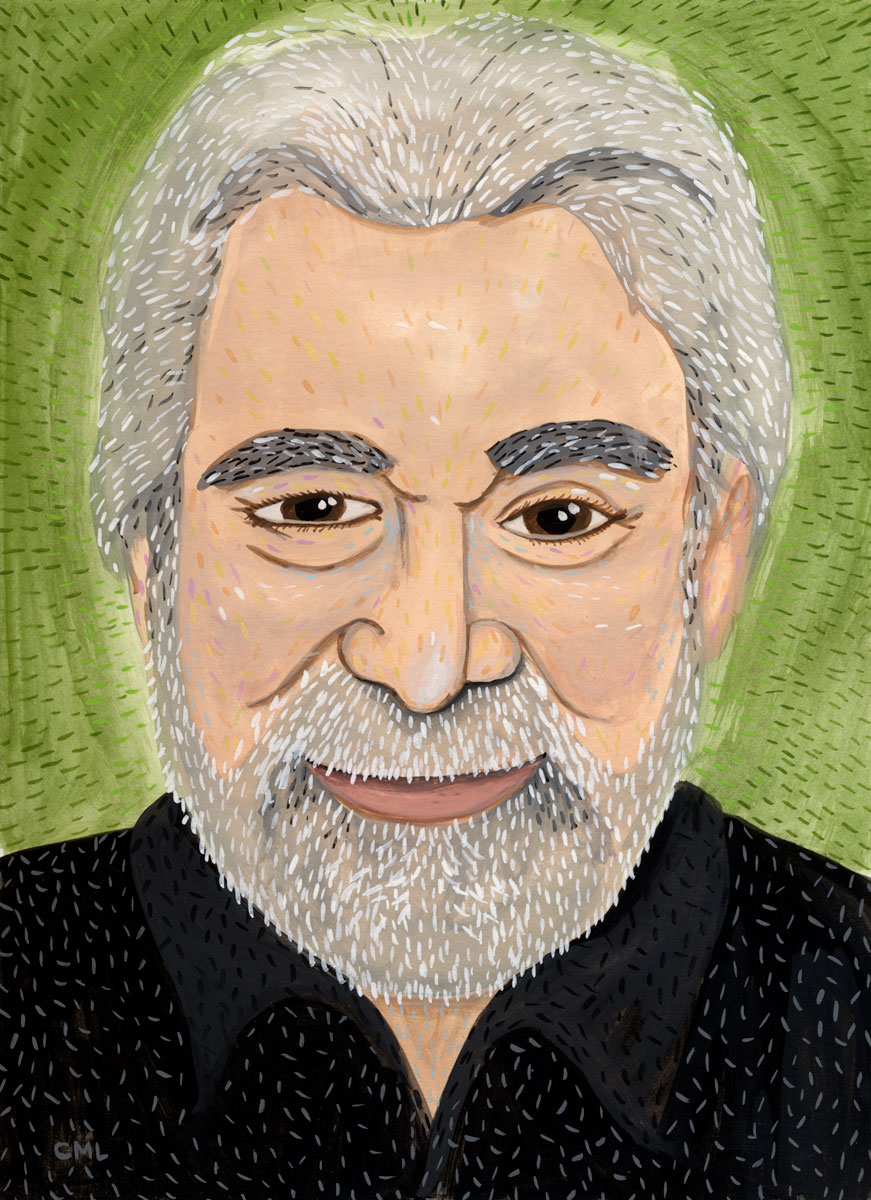
Monday April 24th: Breaking the Bond Reading
The very fine Texas playwright Rupert Reyes brings a staged reading from his latest work-in-progress play, Breaking the Bond, to the U District’s own Jack Straw Gallery. Featuring local Spanish-speaking readers, this play discusses topics of deportation, anchor babies, and national identity. (Reyes has also acted in the film Office Space.)
Jack Straw Gallery, 4261 Roosevelt Way N.E., 634-0919, http://jackstraw.org . Free. All ages. 7:30 p.m.
Book News Roundup: Follow a book through the Seattle Public Library
- This video from Seattle Public Library provides a neat, Mr. Rogers-like look into the path that a book — in this case the 2017 Seattle Reads selection The Turner House — travels through the system.
Speaking of librarians, I just want to make sure that you appreciate how librarians dragged Ivanka Trump for her all-talk "support" of public libraries at the same time that her dad is trying to defund them.
The good people at Artist Trust are launching a "Night School" program of short classes for artists. Classes include "Promotion Fundamentals" and "Business Fundamentals."
Open Culture published a neat look at what children's books were like in the Soviet Union.